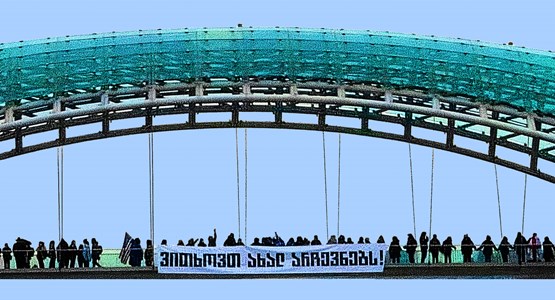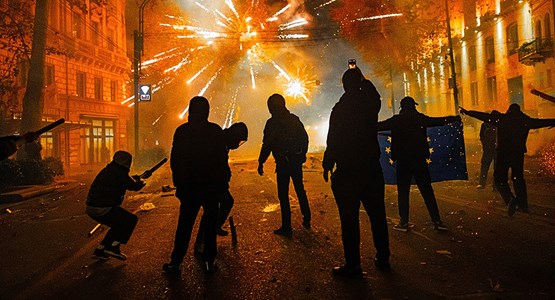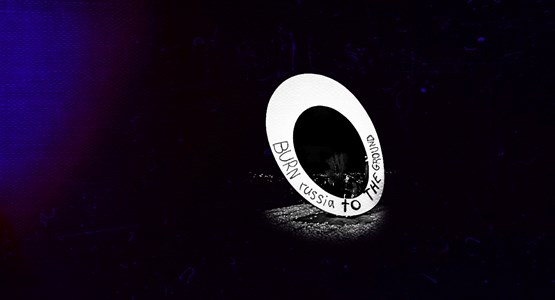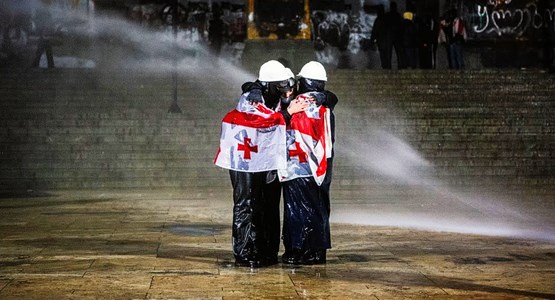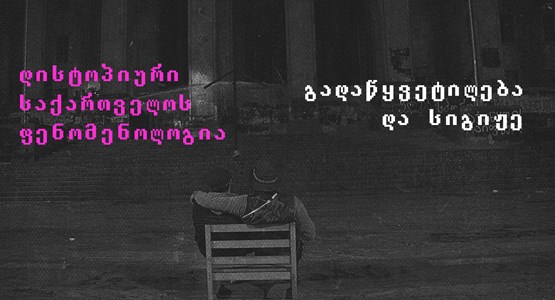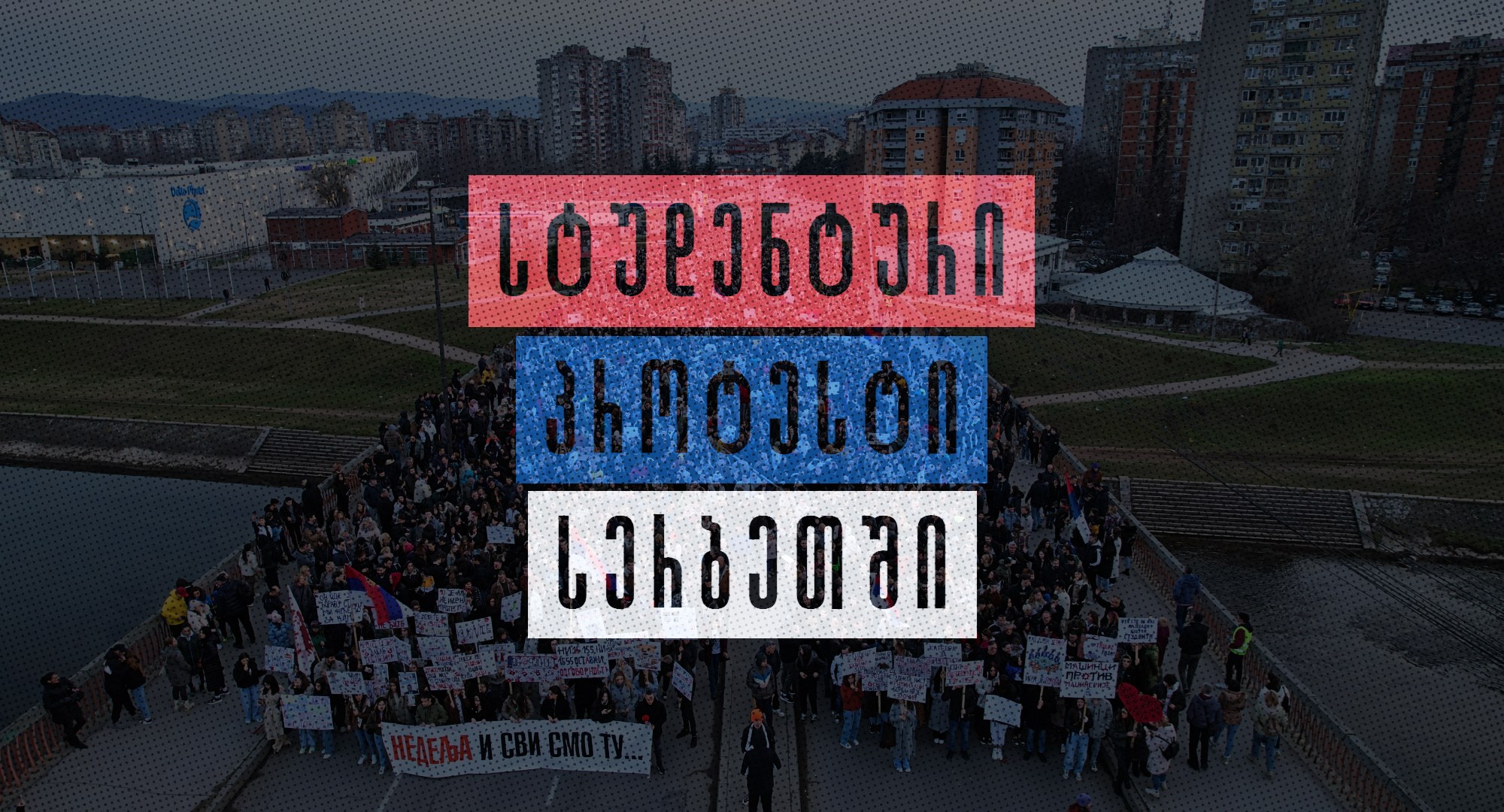
Student Protest of Serbia and Georgian way of reading it
25.02.2025 | 15 Min to readInterview with the Serb writer, cultural worker, activist and an outspoken social commentator Vladimir Arsenijević about the Serbian protests with an attempt to contextualize the process on the background of recent Serbian history, challenges of communication in the Western Balkans and power imbalances between Russia and Europe.
Vladimir Arsenijević is the president of the Association KROKODIL which describes itself “among the very few independent, non-partisan civil society organisations in Serbia that deal with culture and literature but also … committed to developing democratic culture, civic activism and educating citizens on their political rights.”
Since its foundation in 2009, KROKODIL also organizes the annual literary festival in Belgrade – ‘conceived as a regional affair dedicated to the promotion of dialogue, reconciliation and reconstruction of broken links particularly in the region of the Western Balkans,” but now one of the popular events “in the region of South-East Europe exploring the most important cultural, political and social topics of the day.”
KROKODIL also calls itself a ‘think-and-do tank,’ – “dedicated to establishing the rule of law and, bearing in mind both Serbia’s specific geopolitical position today and the importance of European security as a whole, thereby strengthening Serbia’s movement towards the EU…”
KROKODIL happens to be an acronym that stands for: Literary Regional Gathering That Alleviates Boredom and Lethargy.
Vladimir Arsenijević has written a number of novels deeply and profoundly reflecting on the events that Serbia has been going through. His debut anti-war novel that won the prestigious literary prize in Serbia was one of the first works about the ‘violent disintegration of Yugoslavia.” His most recent novel “Spirits” came out in 2024. Arsenijević also wrote the “Diary Through Ukraine” that depicts KROKODIL’s three humanitarian missions to Ukraine.
Interviewer: Tamar Babuadze, Indigo Magazine
...
Tamar: It is Friday evening. 7th of February. While we will be talking, the protesters in Tbilisi will be getting ready for their evening ritual that has not failed to happen every single evening since 28th of November. People gather on the Rustaveli avenue, near the Parliament Building, later on they are joined by the marchers from the Public Broadcaster’s building. There are groups of students on strike who occupy halls of the several universities. These are the steady hot zones of Tbilisi protests since the day it broke out in the non-stop format. What is the everyday feel of the protests in your city?
Vladimir: Students are in constant protest. They do it on a daily basis. The universities are steadily occupied. As for people, they organize themselves to participate in 15 minutes of silence and immobility every day. It starts at 11:52 am – the exact time when the canopy actually fell at the train station in Novi Sad and murdered 15 people on November 1, which is the tragedy that initiated the protests in the first place. So, day in day out, exactly at that hour, in the middle of normal urban situations, when there is the ordinary flow of cars and pedestrians, people one by one simply stop and just stand where they are quietly for 15 minutes. And that's quite intense to witness.
Today’s one of those days, when nothing else really happens, but when you have continuous protests it's normal to have such dynamics – the moments of intensity and then loosening up a bit and then – intensity again… People need to recuperate and regain their strength. But this is something you should also know about in Georgia.
Tamar: Do daily protests continue in just two cities of Belgrade and Novi Sad, or in other places too? Can you draw a more precise urban picture of the protest, like an atlas of it.
Vladimir: The main centers are Belgrade as a capital and Novi Sad – 70 km away, the second biggest city and probably the only actual cultural, economic and political center in the country besides Belgrade. But the protests are going on in Niš, which is the third biggest city, and in many other smaller places. There are various actions, blockades of the streets for instance, activities of different intensities which then merge and intensify in much larger events – mostly organized by the student bodies.
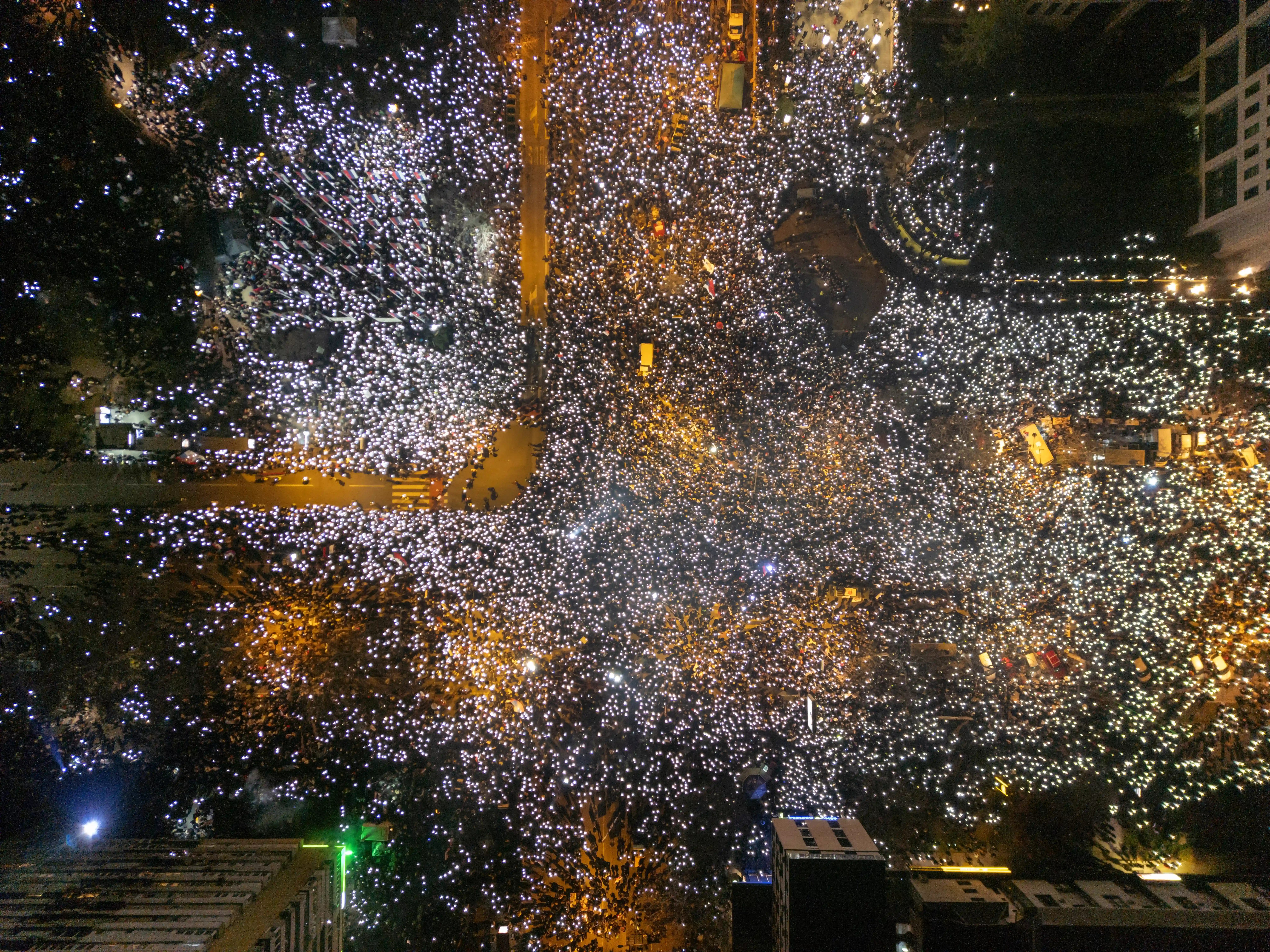
The locations always vary and there is no single spot that people occupy on a daily basis, like you are describing in Tbilisi. There is, for instance, a really complex junction in Belgrade which we call Autokomanda – with many different roads and highways for commuting to or away from the city. When you block it, you basically block all the connecting ways of Belgrade. There are also regular blockades at the intersections of Nemanjina and Kneza Miloša streets, where the government building is on one side, the Ministry of Foreign Affairs on another, and then across the road there is this, I would say, iconic building of the so-called Generalštab, which is the main military headquarters that was bombed by the NATO back in 1999 and was never really renovated. Then also Slavia Square or Takovska street which is the Public Television area and thus a very usual gathering place for various demonstrations, because of the strong awareness that the government is keeping control on media, including the national TV station.
The connection between Belgrade and Novi Sad is also really interesting. Students recently had the long walk – they started from Belgrade University and walked all the way to Novi Sad. Now to walk 70 kilometers is quite an achievement and it certainly takes a while but it was a great performance, actually, because they were visiting various small towns and villages along the way. They were met on the streets by the local people who were bringing out food and other treats and refreshments for them. It was clear that the marching students were evoking a very warm feeling that currently exists in the society. Something that initially appeared to be yet another student protest this time spilled over to other social groups; it really engaged various layers of the public; people from all walks of life so that now even pensioners who were traditionally politically conservative, almost always voting for the ruling politicians, also support the protest and have recently joined in with students against the government – quite a new phenomenon for this country actually.
Tamar: This is very impressive, but it is more or less a recent thing, which happened gradually, right? Because I read an analysis at the end of December which had an emphasis on the elder generation staying out of the process.
Vladimir: I think the wave has become so huge, it's really hard to resist. It has to do with that. It also has to do with a really huge feeling of disappointment generally by the whole nation about how things have been going on in the past many years.
Tamar: I have to ask this, like for how many years? We have “nine bloody years” (a term for Saakashvili's rule coined by GD supporters, but often also used in an ambivalent way) and then we also have “12 Georgian Dream years…” against which people have taken over streets now.
Vladimir: If you ask me… well, I have to go really back in time. So, in 1980. President Tito died and then the whole Yugoslav self-confidence just imploded. The country immediately sank into a massive series of various crises. The first visible one was the economic crisis, but with Yugoslavia being so complex and multicultural, it really turned into a big political crisis. And then the crisis of identity followed and nobody wanted to stay in the same country anymore. We even failed to be impressed by the democratization process which was happening like the avalanche throughout Eastern Europe following the fall of Berlin wall. This inability to perceive and join in the global events was your clear sign of sickness and prequel to the period of the wars that followed. And obviously you had the generation of populist nationalist politicians like Slobodan Milošević in Serbia or Franjo Tuđman in Croatia or Alija Izetbegović in Bosnia and Herzegovina and others, most of them former apparatchiks who grew out of the one party system which governed the country throughout the socialist period, who picked it up and created nationalistic narratives and who are mainly responsible for the very aggressive atmosphere that actually ripped the country apart throughout the 1990s. And then we had a horrifying period of 10 years – of various wars in Yugoslavia that ended up in 1999. with the NATO bombing of Serbia and Montenegro. And Milošević was finally toppled…I am sorry for this long line of sweeping simplifications but all these things are just so interconnected that I prefer not to keep them divided... So, Milošević was finally toppled in 2000. with one of these massive popular movements, which we call October the 5th, because this is the date when that so-called revolution actually happened. Following that, we finally had a solid reason to hope that we would enter a new era. It was really accentuated at that time because it was the end of the decade, the end of the century, the end of the millennium even. The long and tiring period of war was finally over too. So, there was this millennial feeling which was very intense here in the Balkans with the additional feeling that we can now actually really step away from the past mischiefs and step into some kind of better reality. Right at the threshold of the XXI century and the third millennium. But these hopes of ours never really materialized. They were immediately corrupted by another group of politicians, those belonging to the opposition that we kept supporting ardently throughout the 1990's. And obviously the situation was quite risky then for all those who were getting very rich throughout the 1990s and also for those who were committing war crimes and atrocities. The Prime Minister Đinđić, who was trying to do something about it and actually had a functioning working relationship with the Hague Tribunal, was assassinated in 2003 by these groups. That event spiraled us straight back into this very dark period which has its impacts all the way up to these days. In the past 12 years now if I'm not mistaken, the country is run by the Progressive party which is really the offshoot of the extreme right wing Serbian Radical Party. Aleksandar Vučić happens to be our president, whereas to my mind he should have been in the Hague a long time ago because as a high ranking member of the Radicals he was personally deeply connected to many bloody atrocities that were committed in the wars in Yugoslavia for which he was never prosecuted, let alone banned from running for public office. Not even that, but he's a loyal partner of Germany, United States, who are by proxy also actively involved in his hysterical politics, this mindless game of sitting on many stools at the same time – creating various narratives for various partners, dealing with Russia, as is well known, with China, with the Emirates, with the EU. Strange but somehow it all seems to be working in his favor. In the same time his innate destructiveness virtually rips our society apart both from our immediate surroundings, which would be the countries of South-East Europe and the Western Balkans that we are surrounded with but also creates strong anti-European and anti-Western values that have influenced our society and particularly our young to no end. In order to keep this construction stable, he keeps a strong and tight control over the media in Serbia and also over different walks of public life while attempting miserably to create some kind of personality cult, but I would say that the depressive side of his characters stops him from being as successful in that as he would most probably wish to be.
So, life underneath all this was not particularly cheerful. The scar that all these matters left on people’s consciousness was very powerful, that’s why it took some time for the recent protests to find the right definition.
Tamar: But this is not first, as I am aware. There have been previous attempts too in the past years…
Vladimir: There were several major, massive movements organized around only seemingly non-political matters, like urbanistic protests under the "Ne davimo Beograd" (Let's Not Drown Belgrade) aegis, some seven or eight years ago, connected to the building of the Belgrade waterfront area, actually sold to the contractors from Abu Dhabi. Plus a massive row of eco-protests based on the Rio Tinto actions (leading global mining group that focuses on finding, mining and processing the Earth's mineral resources - ed.) that wished to exploit lithium in Serbia and that was also a very lucrative deal done on behalf of Germany with our current president and our government which definitely sheds additional light to the timid reaction of the EU regarding the protests in Serbia as opposed to those in Georgia… And then, when the mass murder happened in the primary school in Belgrade, two and a half years ago, with 11 students murdered by their peer, this deranged 13 year old kid, everybody understood that this was not just the extreme result of one individual and of a very disturbed mind, but that it had direct connection with the kind of undue influence of the culture of violence, provoked by the government itself; people understood that the government was feeding the society with explicit violence itself and young kids were particularly impressionable and susceptible to these kinds of messages. This resulted in the massive gatherings in Belgrade and other Serbian cities in the movement known as "Srbija protiv nasilja" (Serbia against Violence). So now, taking all this into consideration, I think we finally managed to go over that invisible line over which the protests will not just die out as in previous cases.
Tamar: Even though that's what the government wishes for, right? Because, Georgian protesters also got the same direct message that the government will just tire them out.
Vladimir: Yes, that’s the aim of the government. They are working on just keeping control, not provoking too much aggression. There aren't many police on the streets. There aren't clashes with the authorities. There are occasional bursts of violence, but it is manageable and only serves to provide additional fuel to people's anger; and if we were in previous cases, the protests normally would have died out. We’ve seen anti-government movements in this country, for instance massive protests in the winter of 1996-97 with hundreds of thousands of people on the streets, and still they just whittled down. So, I think that now, this dividing line is finally crossed, and we see that this protest energy is now simply feeding on itself.
Tamar: Did you expect that students will take the leading role? Where do you think they have this steady power from? The steadiness that is necessary to not only maintain the protests, but to make it even bigger and more impactful?
Vladimir: They do it with a kind of very complex and layered sensibility and I would like to confirm that, yes, these protests are definitely initiated by the students, and yes, they organize the whole process in a very clever way.
We do have a long history of student movements and political protests organized by the students and run by the students in this country. There was a first protest in 1968, a student protest – in the time of the socialist Yugoslavia. Then throughout the 1990s, there were a series of student protests erupting and evolving consequently in 1991, 1992, 1996/1997 and finally in 1999/2000. And what defined these past protests was something that was easy to guess that it will also bring the end to them: the leadership of mostly one or two persons which were dead easy for the authorities to single out, disassociate from the rest of the student body and corrupt. And in that way the whole protest would inevitably crumble top-down.
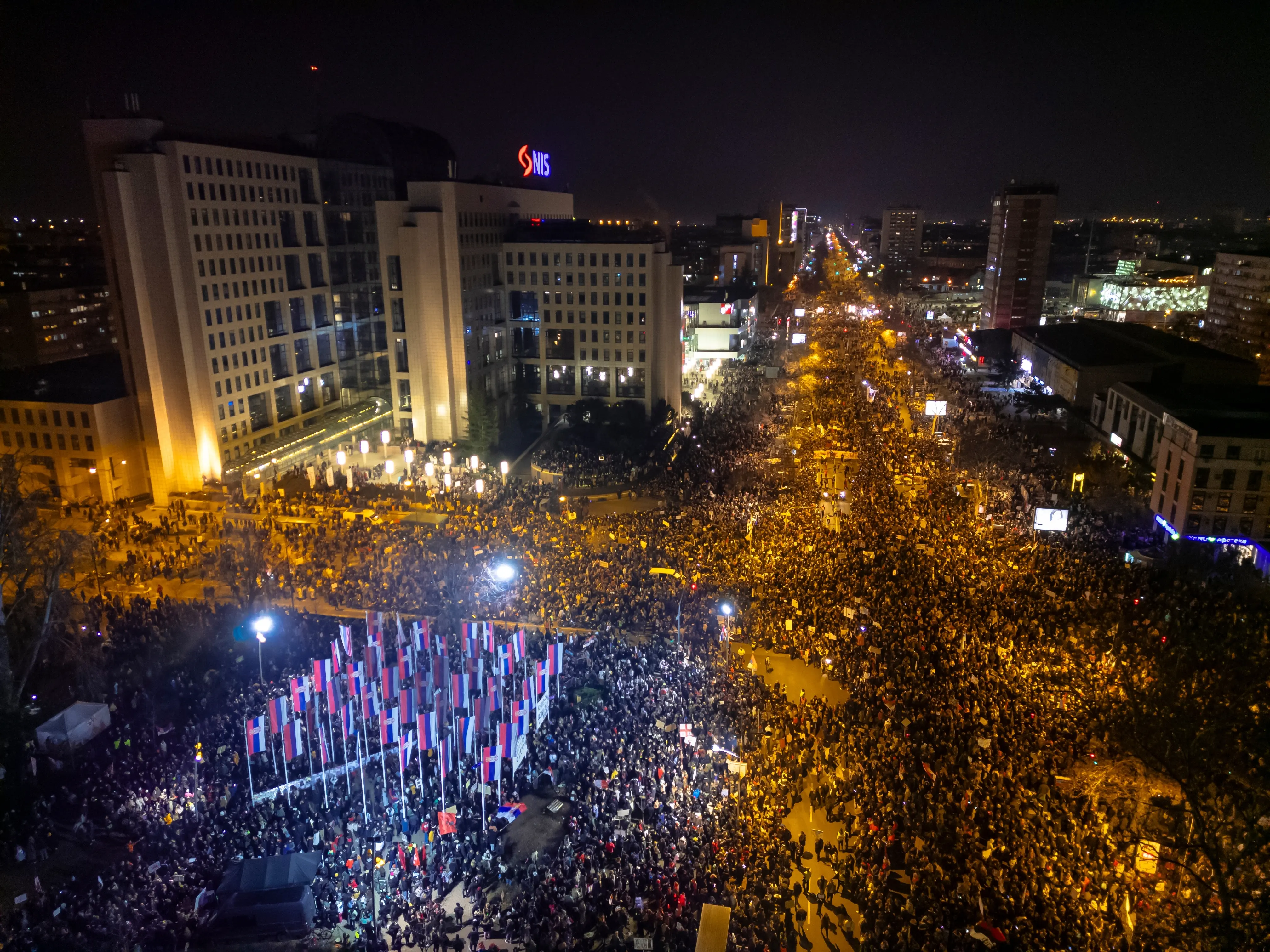
But today there isn't anything like that, there isn't a single person which stands out among the students. The structure of the movement is much more amorphous. This feels like an impossible enemy for the authorities. The student leadership is unknown, everything feels very slippery, they don't know where to grab. Many young people speak publicly on behalf of the students, they change almost on a daily basis and all of them are extremely eloquent and very calm but persistent. So, this is something that simply came as a surprise.
I am now speaking strictly as a member of the generation that I belong to and, like it or not, we are not young anymore. Obviously, there is always a gap between generations and it's only normal for the older generations to be somewhat suspicious of those who come after them. And this is because we don't see them, we don't understand them fully, they appear as a kind of a mystery to us. But in this country particularly, for years on end, what you could get to see and hear from the young people was very dispiriting.
Tamar: Why?
Vladimir: It was just very disheartening. They seem to have grown up into ardent young conservative ethno-nationalists, infatuated with the state-forming narratives, with the romantic evocations of the past that never really existed, really strongly determined not to ever show a critical attitude to all the evil committed in the recent past on behalf of their country.
In the first place, I am addressing this absolutely non-critical attitude towards our first neighbors in terms of war crimes, genocide, various atrocities committed by the Serbian side in the wars of the 1990's which is effectively pushing them away from us. These youth seem to have grown up into very loyal citizens of the country by the recipe of our ruling politicians. So, unfortunately, with boys, maybe there was just one single subculture of football hooligans and oftentimes they too were used by the State for doing dirty, street things for the system’s sake. These groups of young men were also connected to the mafia, a lot of young people went down on this road.
Through all that time these students that represent a completely different sensibility within our youth were simply invisible. You couldn't get to them. In that sense it comes as a surprise that they actually are here and that they furthermore feel the need to invest themselves into creating hopefully a better future for themselves and our children and everybody who comes after us.
And now everybody has their hopes on them. These young people, this time, truly provided huge energy that other people picked up on and started feeling even overly optimistic and exalted. As for me, I am not even fighting with myself, because I just can't provoke that kind of exaltation within me. But I understand where it comes from with some people, because now the citizens of this country finally have something to hold on to and for that reason only they're investing this abnormal amount of expectation onto the students. But it's great that the students managed to provoke that. So, in a way, if they even did not completely change our views of what our young generation is, what they definitely did is make it more nuanced. Because now we understand generations are a myth. I mean they were always there, we just could not see them but it appears as obvious that within every single generation there exists an equal number of various political views and walks of life and attitudes towards anything. So, it's just that they made us see them clearly and it's great that they did that.
Tamar: Maybe it's just about being young.
Vladimir: The whole thing about it. Being young and being responsible, that's also a pretty cool combination.
Tamar: As I am listening to you discuss Serb youth, in the parallel regime I am pondering over Georgian youth who became active in our protests. Even though there are very active groups in different universities, even occupying in a non-stop regime the halls of their universities, or staying outside because university management would not let them inside of the building; even though they manage to organize consolidated marches from time to time, they are not perceived as the leading organism of the protests for Georgians. And I don’t think it’s only a misconception or a fragmented view that is to blame. There are things that need critical evaluation here.
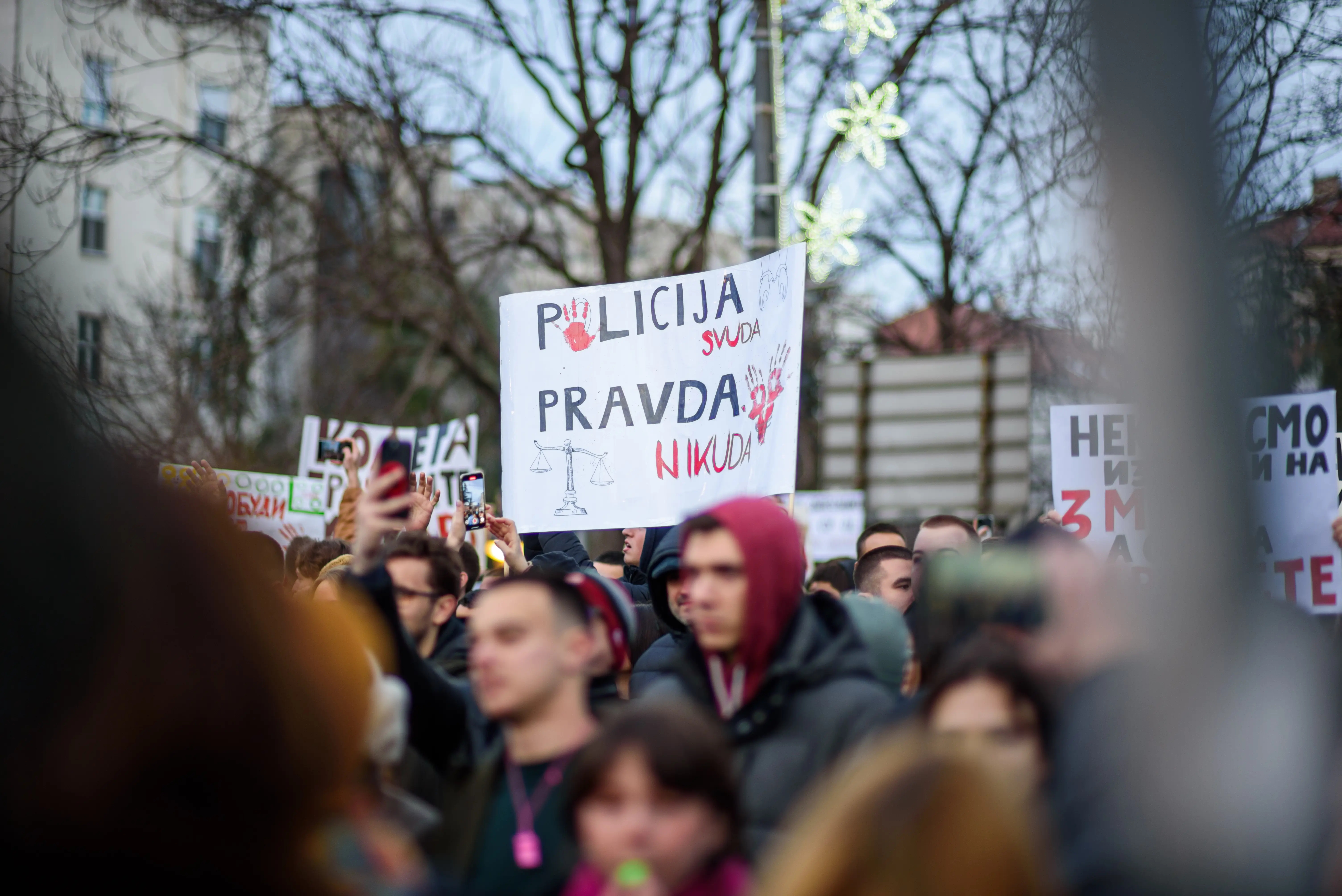
That's why I really want to go back to the initial interest that I had – where this sense of managing the protest came from in the case of Serb youth. You mentioned a big tradition of past protests, but tradition can also have a distancing force and another thing is that all these past experiences are not their own, no embodiment there. That's why, let’s approach this question once again: What do protests’ traditions have to do with it?
Vladimir: Yes, they haven't experienced the past protests, they haven’t lived through them, but they couldn't have not heard of them. And if they really wanted to learn a lot, there are innumerable sources such as books or documentaries. And they did. One major document that they're using, that they've used in organizing the architecture of the movement, was this document called "Blokadna kuharica" (The Blockade Cookbook) that actually originated within the student protests at the Philosophical University in Zagreb, Croatia. On the other hand, this exposes a really interesting regional overlapping of influences. This is actually a really comprehensive document on how to organize the blockade of the university. At one point the Serb authorities were trying to play a spin on the public that actually the protests have been organized by the Croatian authorities in order to topple the legitimate government. Which is just lame basically. If nothing, the blockade of the Philosophical University in Zagreb was against the Croatian authorities. So that couldn't have possibly been used by them. But obviously there is a student solidarity and there is a way for the students to recognize themselves as just being young academics, rather than ethnic Serbs or ethnic Croats, which might be the identities that just don't leave such a huge impression on them.
We see this now, and I think this is also just another extremely important outcome of this protest for the future of our relations that will create a positive influence in the region. We already witness vivid and powerful examples of this influence: The Serb protests have provoked various activities around the region and there is a lot of goodwill and a lot of optimism towards the young people of Serbia communicated by the citizens of Croatia, Bosnia, Macedonia, all these countries that we used to live together with before Yugoslavia got messed up completely. If at one point there was a thought that we would never be able to recover good relations between each other, now it all shows how relations can actually be recovered relatively quickly if they are actually motivated by goodwill.
Tamar: Are they supporting the protests in Serbia, do they share the sentiments of this fight as something like a common cause?
Vladimir: Not only are they supporting protests in Serbia, but they also see lots of parallel lines as well, and they are communicating to their own societies. When we say "The Region", what we really mean is "former Yugoslavia". We just don't even say it anymore. But within "The Region", there's really two regions. I mean, if you ask people in Brussels, there are Western Balkans, which is the five non-EU countries of the region and then there's something unofficially known as the South-East Europe, which represent Croatia and Slovenia as the EU-incorporated part of the region. But this dividing line is really purely administrative. We here do not really see it. I think for everybody, even including the most hardcore nationalists here in the region, this dividing line is not that tangible. If you travel from Serbia to Croatia or from Croatia to Bosnia or from Bosnia to Montenegro etc, you're not really abroad. Can you see what I mean? This is this one zone, and we recognize each other, we know each other well, we share similar sensibility, general energy, sense of humor. Lots of us on top of that share the same language. Obviously, some things are simply incomparable, like the quality of life in Slovenia with the quality of life in Kosovo. But still nobody has enough reasons to be absolutely happy in their own country. And that's why when people see the situation in Serbia, they compare it to something that they have at home and they understand that things are comparable still, that you can learn something about the society that you live in by watching the processes that happen in the society next to you, which is really something that we need. And if you ask me as a writer, this is exactly what I have been about ever since I came up with my first book in 1994, and if you ask me as a cultural worker, this was the focal point and essence of my activities ever since I initiated the publishing house Rende in 2000, and, likewise, if you now ask me as the president of the Association KROKODIL, but also if you ask all of us in it, well, this is what we have been doing ever since we started in 2009. We really want regional communication to keep on and evolve further because we understand that we really need each other if we want to create a decent future for our children. This process accentuates this complex background of our lives and to my mind this is probably the biggest, I mean the biggest legacy of the current protests.
Tamar: Vladimir, since you already touched on the topic of KROKODIL, let’s talk about your work at this organization. Did you – even slightly have to adjust to the ongoing protests, modify anything at all?
Vladimir: No, we do our own thing and we've learned through time and experience that, for us, the best position in the society is in this undefined zone in between the cultural and literary activities on one hand and then socio-political, activistic but also humanitarian engagement on another. This is where we find exactly the right place for us, even though we are not at all comfortable in this society because a lot of pressure is directed towards us from different sides. We are forced to fight off legally altogether 28 Slapp lawsuits imposed by the state against our activists and people employed by us because of our activities against hate messages of various kinds that the walls in our cities are virtually saturated with and we have made it our mission to keep on removing that crap. We suffered a lot of violence against us because of our activities directed towards Ukraine. Besides many other programs designed to provide support to Ukrainians, we have already, three times in a row, organized collection and personal distribution of humanitarian help to various parts of that war-torn country. This does not make you necessarily very popular in the mainstream of Serbian society. And we were always championing the decent and mutually respectful relationship with the neighboring countries, the regional relationship and the responsible attitude regarding all the misery that Serbia has left all over the place after the 1990s and never had a decency to face the consequences and to analyze them and to responsibly accept responsibility, right? So, with the authorities in Serbia that are nurturing this complete denial, it does not go easy. And it goes down to absurdly simple things. For instance, inviting a poet, who happens to be a Kosovar Albanian, to conduct a reading in Belgrade might provoke very, very strong reactions. So, we stood through all that and we are still working. Oftentimes, our KROKODIL Center is vandalized by right wing thugs. Truth be told, not 'oftentimes', but more like on a daily basis. It just happened yesterday too and we had to once again go outside and scrub these hateful messages off.
Tamar: What kind of people are they?
Vladimir: We have security cameras, so we always find them; we see these faces, and sometimes it just makes you sad. These are young people, very typical football hooligans again, with short hair, hooded jackets and you know fancy sneakers and things like that. Might be at most 17 or something, but when you think about them, you will understand how this obvious line goes through the society from them upwards all the way towards the people who are actually directing these kids. This line can take you very high up, probably to the highest political circles of this country. Same happens online – series of insults and threats – and I know that these accounts are just bots, basically, but then there are also actual people who pick up on that. And then you understand what kind of people would dance around bonfires in the medieval ages.
We collect all these things and are very eager to inform the police about various threats. Most of our staff are women and there's a lot of sexual innuendo there, threats with rape, murder. But the actual response activity by the police never happens even when we bring all the material and the footage from the video cameras and everything. We had another important case, when during the interview at the national security and intelligence agency BIA, the malicious spyware was secretly installed in our director's telephone and we found that they were very eager to spy on us and to check our calls and everything. This is the situation in which we live and work, while also really struggling hard to survive – dedicating a lot of our time to finding substantial financial resources. And when you are burdened with so many non-productive activities, you understand how the Slapp works and what's the meaning behind it because you end up spending days in different courts, meeting various judges, explaining yourself… and lawyer services cost a lot, and your time costs a lot at the end of the day. And all this effort is needed for us just to accentuate the fact that there is a more normal, easygoing, friendly way to communicate with your reality. And I mean: with the whole reality. Because we live in a society which seems to be only good at producing various enemies. It's absolutely fantastic where Serbia actually found itself in the 21st century. If you start from here and go in concentric circles and then if you first check our immediate surroundings everybody will seem to be our enemy. Europe is also our enemy. And then everybody else, the whole Western world is our enemy. There is only one friend, which is this deranged fantasy of Russia that is very carefully nurtured here. I mean, the way it is perceived here by the significant portion of the population has nothing to do with any realities or actualities of Russia or anything which could historically be proven in terms of the relationship that Serbia has ever had with Russia. So, it is important to understand that this has been a created dream of a larger protector, a big brother, that would save Serbs from all their enemies. And Serbs just keep this fantasy going, little by little, until their reality became completely distorted. And now we ended up having to fight this kind of demon in our country.
Tamar: While discussing the mental production of enemies, it is also a very comfortable paradigm for many Georgians too to lock on. For us too from time to time, from one group of society to another group enemies can be everywhere, except our own self and decisions; and we just see a bleak attempt within these protests to move out from this paradigm and to try and evaluate our own decisions critically; or the situations we went through without blaming everything on other forces (who can truly be enemy of course, ha!).
But you mentioned the judicial system, which can be trusted in your country, right (unlike us)?
Vladimir: But you know, Tamar, we have been geopolitically lucky here. We are surrounded by the EU countries. NATO is also all around us. Many horrifying things that seem to be possible and that are definitely possible in Belarus, let alone Russia, are simply not possible here in Serbia. We had the case of Andrei Gnyot, who was arrested by the Serbian state because of the extradition order to Belarus. In the end he was not extradited, I think, he's in Germany now, but Belorussian community here in Serbia was engaged on his behalf. They were protesting in front of the court of the Palace of Justice and they were carrying banners of people who were arrested for protesting against the government in Belarus and who then were completely lost in the prison system. And you could read that something like a 24 year-old Belarussian girl had been missing for 625 days. Nobody knows where she is. Or let’s say any given person in Russia, just a complete nobody who would, let’s say, dare to use the right name for the 'special military operation' and call it 'war'. And that person will be sent for 25 years somewhere in Siberia, thousands of miles away from home, and then disappear completely.
But in Serbia, these sorts of things are mostly treated with very petty misdemeanor charges. With Serbia being always slightly tragicomical, here you will usually be told that you have to pay a fine of 10,000 dinars, which is like 80 euros. But if you pay in a month, you get a 50% discount. So here facing these charges is like burgeoning in a supermarket. But then we said, no, we're not paying. We aren't paying because we were just removing hateful nationalistic graffiti that was illegally placed on the facade of a public building and we made sure to use the neutral color for graffiti removal – the primary color of the building so it easily blends in. One of our misdemeanor charges is really Kafkaesque. It says that by applying white paint on the white wall, we destroyed the surface of the building. How is that possible? But we managed to fight that one off. We proved to the court - and it took some effort - that applying the white paint to the white wall is not destruction but reparation and thus shouldn't be a misdemeanor charge, offense, and anything like that. These charges are actually designed to tire you out, to squeeze the soul out of you and relieve you of your energy to keep on fighting. However, they all are indeed very petty when compared to Belarus or Russia. But when you get slapped with something like 30 of those charges for ‘rude and reckless behavior,’ whatever that means, and when you are forced to deal with different silly things like that, again your time is wasted and your money is wasted. And then you go to the court and then you meet various judges and then you see that the court is completely systemless. We have won three cases so far, and now our lawyer is using those in order to fight off the others.
Tamar: And we quietly crawled closer to the topic of Russia and the perception of Russia. I wonder maybe this protest will also tackle this sentiment about Russia in Serbia?
Vladimir: On the surface level these young protesters are neither pro-Russian nor necessarily anti-Russian, this topic is just not a part of the big picture at all. I think keeping quiet about it is the way to avoid unnecessary discussion which could probably take the wrong path. God knows what all these people think about Russia. Yeah, we don't know and I don't want to badmouth students, since I'm not completely sure about their politics in all these aspects. The good thing is that it doesn't show; that this doesn't seem to be an important topic for them. And then it ceases to be an important topic for society at all. That's a good thing. Because the amount of toxicity that Russia provoked in Serbia is of immense proportions. I was absolutely sickened. I couldn't believe what we were going through here in the past couple of years.
The one weird thing, you mentioned the Russian community in Georgia. Serbia also received, I think, around 300,000 Russian nationals, a lot of them continued further to other countries of Europe, but there's a sizable Russian community in Belgrade and in other cities of Serbia. I think everybody, including our authorities, were really surprised with the amount of anti-Putin activities among the Russian diaspora. I'm not claiming that this is a huge majority, but this is definitely a pretty large and politically loud minority. I would say maybe around 10%. The rest of that diaspora is really here for business and they don't express any politics at all. And we have these notorious TV stations controlled by the government, and in that sense also very pro-Russian, that have never managed to find a single Russian person to join in their stupid political talk-shows in support of Putin and his policies. Which definitely tells you something about contemporary Russia and its citizens that nowadays you don't get to hear about in the media practically anywhere. And it also provides a glimpse into the politics of Russian nationals here in Serbia. And we do have a lot of graffiti and murals dedicated to Russia here. There were at one point thousands of the letter Zs just scribbled on the walls in Belgrade. There was the mural dedicated to Putin, with Putin's face, defaced day in, day out, with some groups of people trying to recover it, and with some others again defacing it. But all of them were produced by the Serbian extreme right wing groups while several Russian activist organizations formed here were actively engaged in erasing them. It is a weird thing that we didn't see coming and now a number of Russian nationals are facing backlash from Serbian authorities, particularly those that are actually openly politically active in that kind of fight. There are a number of lawyers and human rights lawyers who are fighting on behalf of these Russian and Belarusian people.
Otherwise, this sick attitude towards Russia has a layered historical background. This new wave of idealization of Russia has to do with the denial of politics of the 1990s. The general Serbian narrative is that nothing was really happening throughout the 1990s here and we were just busy growing flowers in Serbia while in the same time we were horribly mistreated by our demonic Serb-hating neighbors. And then, all of a sudden, this evil NATO bombed the hell out of us for no reason at all. And as if that was not enough, they also sprayed us with the depleted uranium and now we are all dying of cancer. This reductive self-victimizing storyline works wonders and goes like this: "NATO bombed us, the whole West bombed us, while Russia has never bombed us, and China has never bombed us. End of story." If you control the media, if you supply people with all kinds of shit on a daily basis, and if you make sure to keep a lousily educated society with around 60% of technically literate people, you can do whatever you want. And the role of printed media is great in this. We do not have a single decent daily newspaper in this country. All of them invent various enemies on a daily basis and present them on their front pages. And then you look at the public transport early in the morning and the working class people going to work are reading this cheap tabloid and whatever absurdity, vulgarity is written there becomes their point of view; their way of seeing things; their tool to explain the world around.
So, it's just manipulation. But I also think that it's an overblown balloon, that it doesn't have any substance. I mean, the Serbian, every Serbian person couldn't care less about Russia. We are nowhere near Russia. Historically, we have been so far away too. The massive part of Yugoslav self-confidence was in another famous storyline where Tito said no to Stalin in 1948. Our pride throughout the socialist period was built on the fact that we were not part of the Eastern Bloc; that we had our own path, that the country was far more open than other socialist countries of the era. This was also reflected in the economy, simply life was better, we could develop tourism... These are things that people still remember, and this almost erotic fascination with Russia, as I said, is just an infatuation with the big brother of a frustrated nation that found itself on the slippery slope, and now is grabbing whatever it can. And here it is – Russia – an undeniably massive thing there in the world and you think that you're somewhat being protected. But whenever they're making rational choices, I mean if a Serbian person wants to go and improve his/her life, Vladivostok or elsewhere in Russia is not the choice. Stockholm or Munich is the destination; if sneakers are bought, they are Nikes and not Russian brands. So, come on now…
Tamar: I will not go into that topic of perception of Russia among those who aspire to join EU (according to the most recent polls 80% of the population) and among those who protest against the Georgian Dream government on the streets.
Vladimir: You don’t have to, because I know it from Ukraine. And those same Ukrainians were shocked with Serbian attitude about Russia, completely shocked. I think Ukrainians generally saw Serbs as potential friends, and we just badly cheated on them. First time when we from the Association KROKODIL traveled to Ukraine in June 2022, we were stopped at the border, and had to spend the night there, and they were nice, but they told us that most of the Serbian nationals who enter Ukraine end up on the Russian side and fight for the Russians, because yes, they had an influx of these mercenaries going to fight on the side of the Russians. And it just makes you feel really, really bad. Then we traveled all across Ukraine from Uzhhorod and in the West all the way to the easternmost parts of that huge country in order to personally bring humanitarian help to the Perinatal Center in Kharkiv. And we were stopped at the checkpoints on the roads and nobody treated us badly because of our Serbian passports. And this too would make us feel shitty. It's just not fair. But Ukrainians would only ask: "Why are Serbs doing that to us?" And I would say that I really don't know. And they would reply: "Well, they should really be neighbors to Russians for at least 10 years and surely they would change their minds."
Tamar: And one very interesting detail is that many Georgians volunteered to fight in the Ukrainian army and we still get news of a Georgian soldier who died in Ukraine. And when you check their biographies, it often turns out that these soldiers have previously fought in Abkhazia and in South Ossetia. So they have this embodied experience of fighting against Russia; and while fighting for Ukraine, they were actually fighting for their lost war with Russia on Georgian territories.
But I wanted to touch on another topic – Georgian protests produced a whole new set of slogans which can be viewed as collective shout-outs of the protesters' consolidated mind. And new in them is that it's about condemning oligarchic capitalism, authoritarianism, injustice. This is the first time that people actually consolidated around this total, radical refusal to all forms of injustice, saying that justice for all, transparency and solidarity are our ideals. And that's the aspect that makes me believe that the anti-Russian sentiment that the protesters have here is not about ethnic hatred of ethnic Russians per se. It's about very harsh condemnation of an occupier in the first place, but also of a Putin style governance too. And maybe the protesters in Serbia will also link that the stuff they are against are actually equally important in Russia also. People just can’t protest there anymore… So I believe that realization will also come to people.
Vladimir: I really think that even whether some conclusions are reached or not, the Russian project will just be left to die out without big consequences here. However, we have seen how the government is actually playing this pro-Russian/non-Russian kind of waltz and they have been steadily supplying guns and ammunition to Ukraine. They have also been organizing humanitarian help for Ukraine, and they had all these slightly non-formal kind of under-the-radar meetings between Zelensky and President Vučić on different forums. Mrs. Zelensky was coming to visit Mrs. Vučić and they opened the Ukrainian corner in the city library of Belgrade. And there are all these different things going on, because I think that this is what our government appears to be relatively capable of doing – to sit on many different chairs and to produce different narratives for different reasons and political goals.
What I'm concerned about when it comes to the protests is the fact that, like you have said, they don't seem to have any direct contact with the political class. This is of course the standard proof of their quality – that they are clean. Which feels nice, but it's actually non-productive. Do you know the term Jewish mother? The mom who is overprotective and caring? I guess I'm getting to that point in life when a person becomes like a Jewish mom. So everything is fantastic but I have a sneaking suspicion because I just don't see a link between what the students are doing and the major chunk of the society which is happily joining in with all their illusions and misconceptions alongside and our depressingly inapt political representatives. Even further on, I don't see any evolution in our political representatives, to be honest. This is just one bunch of nationalists fighting another bunch of nationalists for power and nothing else. And I'm not even simplifying this. So, whoever is going to represent this movement of people when time comes – will need to pass the threshold and enter the institutions because this is where change needs to happen. The political opposition is keeping very quiet until now, because they are hoping to capitalize on the student movement but, stupid as they are, they just still can't figure out how to do it. And I think again, one of the major successes of the current government is that they managed to completely annihilate the real opposition. I mean, in the 1990s, in the worst of times, Milosević was always facing a very strong oppositional movement that kept growing and growing throughout the 1990s against all odds. The way that Vučić managed to turn this opposition into this completely insignificant force is absolutely amazing. And I don't see them recuperating. The only thing that could actually save us is if something similar to Podemos in Spain happens in Serbia and our Green-Left Front all of a sudden grows tenfold larger than it has ever been on the wave of the student protests. But this is not going to be followed with the proper infrastructure. Therefore, I don't know how the implementation of that kind of responsibility should go. But this is the one party that could actually genuinely follow the guidelines set up by the students. Everybody else is simply not on that frequency. Everybody else is just cancelled. And Green-Left Front came to be around these pre-protest phase against building of the Belgrade waterfront. It was then called "Ne davimo Beograd" (Let's Not Drown Belgrade) – urbanistic protest which was actually political. And then little by little, already as Green-Left Front, they played a pivotal role in the Eco-protests. They are deeply tied to the protest movement in Serbia, but so far, they haven't grown enough. They have some positions in the local governments and cities and municipalities, but when it comes to parliament, I just can't see them growing all of a sudden that much to be able to take that responsibility. And this is where my fear really starts to overcome my optimism because I just don't see the way to turn this into something tangible. And I think this is also what the President and the current government are hoping for. That whatever the society does, simply nobody will rise to represent it. Ever since the beginning of parliamentarism in Serbia I had a hard time finding proper representation in the political world so when I was voting I'd usually be voting like the French – holding my nose – because mostly I would be detesting the policies of the people that I voted for.
Tamar: What is the maximum of the goals that they want to achieve?
Vladimir: I think students play this sophisticated game with the authorities. They never asked for the resignation of the president, or toppling of the political mainstream, or anything revolutionary. They just wanted responsibility and justice regarding the tragedy in Novi Sad. But the thing is that if this trigger is pulled, the whole house of cards will collapse immediately. So, for the first time, there is a way to achieve a political goal without directly asking for the political goal, which I think is the main power of these protests. But they also stay away from different things and this is where I see the major difference between the Georgian protests and the Serbian protests. Georgian protests are unabashedly pro-EU and anti-Russian. Serbian protests as I said do not introduce Russia in any way in this whole picture but they are very EU ambivalent, to say the least. And most probably some of them, or many of them, I'm not sure, maybe even anti-EU. Again, they don't tell you.
Tamar: Vladimir, is one of the reasons for this anti-EU attitude, a very long EU accession process – maybe frustration lies there.
Vladimir: I think this whole Rio Tinto thing really produced another wave of anti-EU sentiments among the younger generation, because they were given another reason to believe that we are perceived as a colony. Maybe we are just good for Europe for our raw materials – if somebody can excavate resources here and use them for their own benefits, maybe this is what we are good for – this sort of thinking.... And we have seen the influx and the flurry of activities when the Rio Tinto project was halted by the popular uprising. All of a sudden major EU politicians were coming here and negotiating and clearly it was something that they held very dear. And I think the Eco-protests were right in pointing out that not all the necessary measures are taken in order to be sure that our nature will be protected. That's why these protests were supported not only by people who appeared anti-EU, but by many people who are actually pro-EU, myself included. But for the young people, their memory is relatively short and otherwise, the EU appeared like a very distant and very cold thing that does not necessarily need us. And Serbian politics never provided clear securities that they are really, honestly, genuinely onto that EU path and that they're really trying to open these chapters. From both sides it was just a game of tactics. And this is the kind of atmosphere in which young people were brought up. No wonder that they're confused by this whole thing.
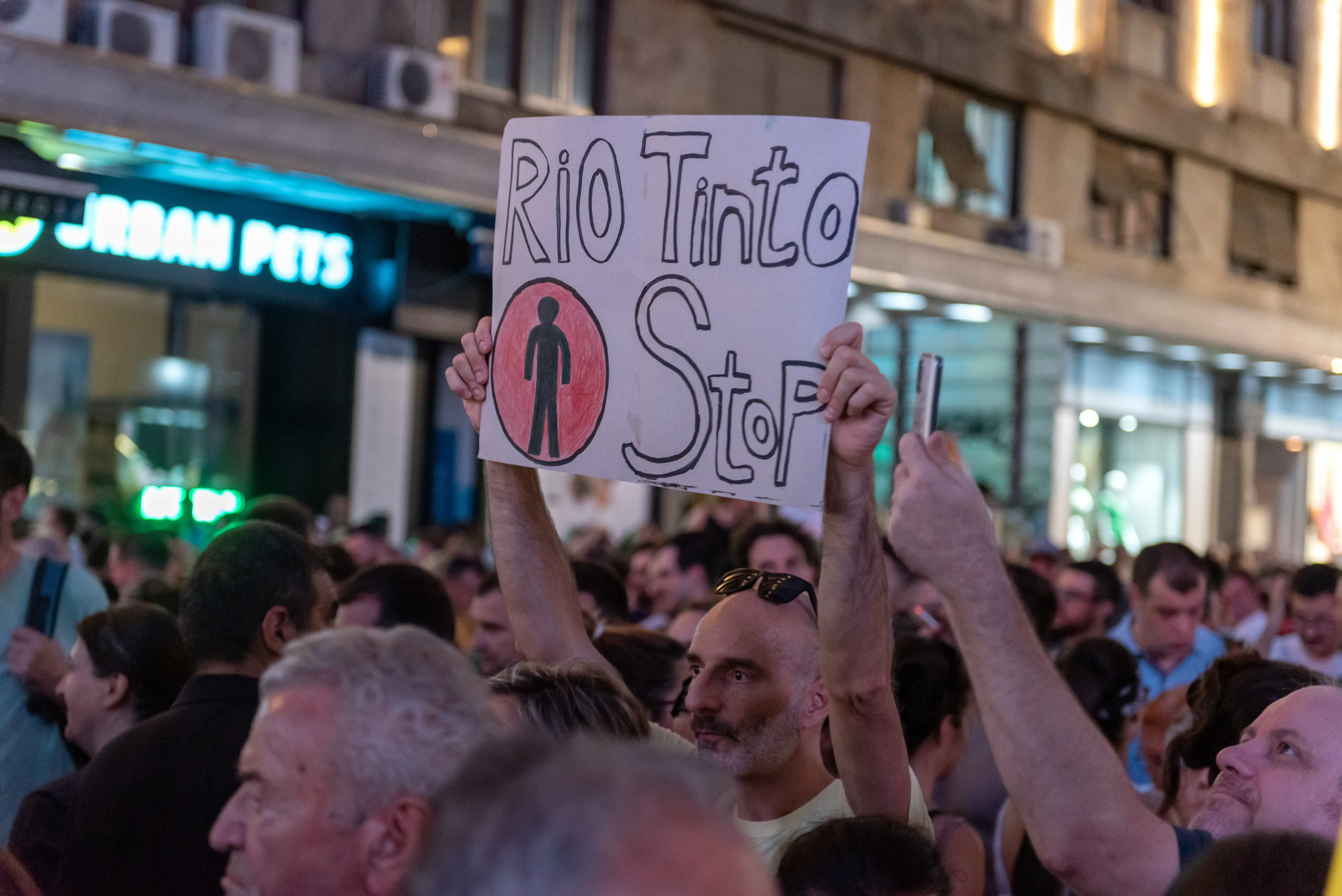
And now, while leading these protests they don’t discuss the EU, they try to stay away from the political parties completely, which is kind of understandable, but not particularly clever. And they are also disassociating themselves from the whole civil society. Well, Association KROKODIL is definitely an NGO and we are in touch with the students, we bring them food and refreshments and things like that, and they accept this help from us. But on a conversational level, NGOs have been demonized in this country since the beginning of this scene. Ever since the early 1990s up until today the civil society was continuously and systematically demonized in this country. And it shows on the attitudes of our youth as well.
Tamar: Like our slang word from the 1990s that still lives on – devised for NGOs in Georgia – ‘grant eaters.’
Vladimir: Yes, there is this myth in Serbia too in which this satanic figure of George Soros supplies local NGOs with endless ammounts of dollars in order for them to undermine local politics for the benefit of neoliberal globalistic agenda. There's a lack of understanding what NGOs represent and this lack of understanding also stems from the above-mentioned negative propaganda that has been feeding minds of people for far too long. Our students also reflect these trends of our society; they grew up here and they uncritically adopted a lot of crap that exists in this society. For better or for worse they are playing this game in which they are trying to avoid necessary problematic discussions. But it really depends on how you view them – what’s the amount of your belief in their capabilities. Maybe all of that is wise, and maybe some of that is just the fact that they don't know how they would deal with the consequences if they admitted certain things. But I think they can’t avoid this topic forever. Time will come when they would need to show a little more bravery and stand for some things which are not downright expressly popular in the social and political mainstream of this country.

